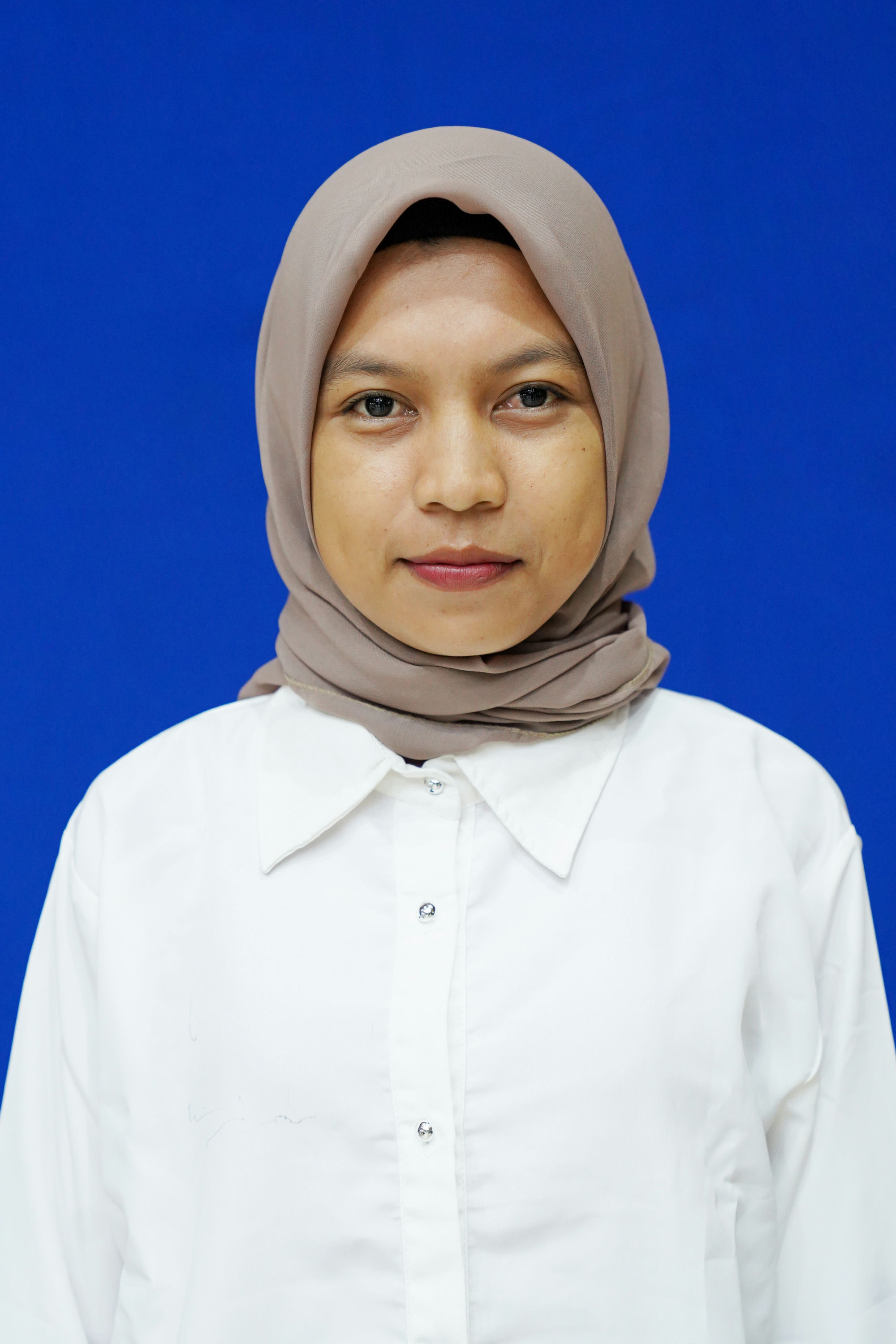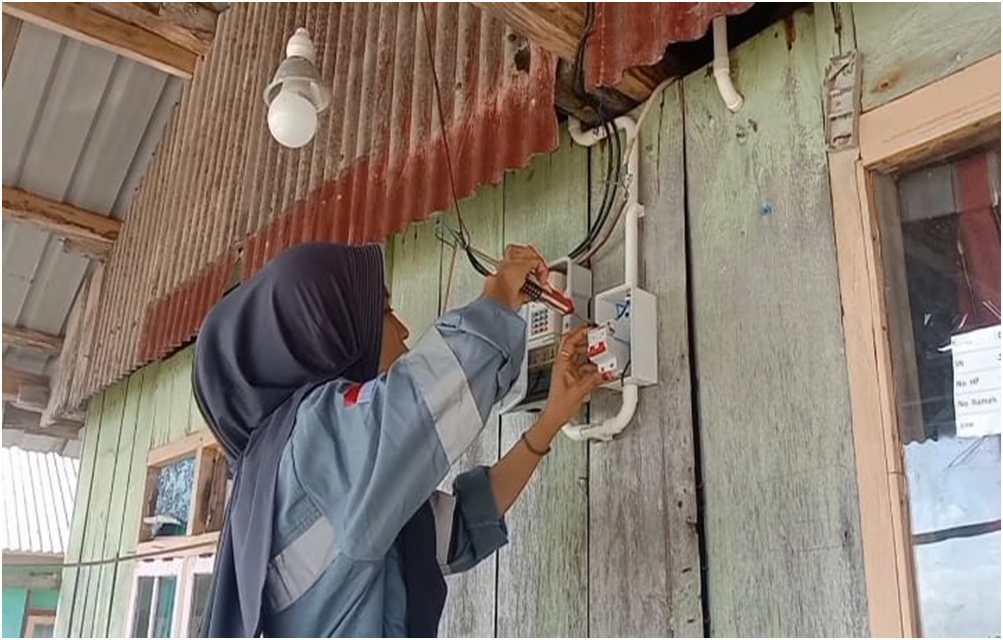Sri Wulandari: Igniting a glimmer of hope in Wongkolabu Village
At 24 years old, Sri Wulandari navigates her way to the powerhouse, managing an abundance of technical preparations for the solar power plants while anticipating the ongoing facility construction. Fondly known as Wulan, she hails from Wangkolabu village in Southeast Sulawesi, situated about two and a half hours from the capital regency.
Wulan, a high school graduate who recently delved into electricity-related subjects, doesn't let her limited experience deter her. Upon being selected as an operator, she eagerly embraced the opportunity to learn and contribute to building a better energy future for her village.

Hi Wulan. This marks your inaugural venture into managing electricity-related tasks. Could you share a bit about your background? Do your parents work in this field, and have they provided you with support and guidance in your new undertaking?
Neither of my parents has any experience in the field of electricity. Our village, being situated near the sea, primarily consists of fishermen, including my father. My mother is a humble yet incredible housewife, dedicated to raising me and my two brothers.
Despite lacking an engineering background, when I informed them about my selection as a local operator, they were as thrilled and happy as I am. They have been genuinely excited to witness my journey of learning something new, particularly because there are very few girls in our community venturing into this field.
What education have you had, and does that education support what you do as a Local Solar Power Plant Operator?
Although I do not possess a formal engineering background and hold only a high school degree, I believe my education adequately equips me for the role of a local operator. Why do I say this? As operators, we need to be accustomed to continuous learning and possess a robust memory. The role demands constant adaptation to new information, and fortunately, I have a genuine passion for acquiring new knowledge.
What has your journey looked like, from when you began up until participating in the UNDP ACCESS project?
At first, I received an offer to join the ACCESS program from another one of the PEAPs (Patriot Energy ACCESS Program/village facilitator). However, at the time this opportunity to become a Local Operator (LO) emerged, I was already employed as a Posyandu cadre (a hyper-local maternal and childcare center).
Despite my existing role, I found the opportunity to become an LO intriguing, particularly because it's uncommon for women to delve into this field in Wangkolabu Village. Traditionally, women here engage in roles such as health cadres or teachers, or they might work as daily fee collectors for diesel generators or assist with water lifting.
When the chance presented itself, I eagerly participated in the selection process. Prior to the tests, I devoted time to studying and seeking guidance from the PEAP who had contacted me, to enhance my preparedness. Serendipitously, my family was also highly supportive, amplifying my enthusiasm for the endeavour.

Wulan installing an electricity meter for a resident in Wongkolabu village.
How do you view the work so far? Tell us about the opportunities and challenges you have faced - what is it like doing this job?
As the Solar Power Plant (PLTS) is still in the construction phase and not yet operating, I can only share my experiences related to the PLTS preparation process. One particularly challenging aspect, in my view, was the installation of the meter and the cables. The cables proved to be quite heavy, and the installation required climbing, which might be perceived as a challenge for women in this role.
Each village has two local PLTS operators, one man and one woman. However, I have concerns about situations where the male operator is not present in the village, perhaps due to other commitments outside the village. In such cases, if there's a disturbance at the PLTS, I might have to engage in physical work, which, as a woman, could pose significant challenges.
As I mentioned earlier, another aspect is within the shelter (powerhouse), where numerous cables and equipment are located. At times, I find myself forgetting certain tasks, so I need to refer to my prior learning, especially during pre-On Job Training. This emphasizes the need for operators to be meticulous and attentive in their duties.
In your opinion, does this field of work pave the way for further career development?
My aspiration is to work in Wangkolabu Village and give the best that I can. I was born and raised in Wangkolabu, and I want to focus on what I can bring at this time – which is being a local operator. I hope there is always a way to continue serving the people in Wangkolabu.
What makes you want to keep working in this field? Do you see an impact on your community or your surroundings?
Being a small part of the broader project's purpose brings me immense joy. I firmly believe in the positive impact that renewable energy can have on the lives of our fellow villagers in Wangkolabu. It has the potential to create opportunities for everyone to thrive and elevate their standard of living.
The enthusiasm among the people for PLTS electricity is palpable. They express their plans to initiate small businesses that were previously hindered by the lack of electricity in the village. Some individuals are even dreaming of acquiring appliances like washing machines or refrigerators, items that were absent in our village due to the absence of electricity.
The energy generated by the PLTS is seen as a superior and cleaner alternative compared to the diesel generators we have relied on in the past. This benefit extends not only to reduced air pollution but also to the absence of noise pollution created by diesel generators. Moreover, with electricity from the PLTS, we can enjoy a continuous power supply throughout the day, a significant improvement from the previous scenario where electricity was only available from 6 in the afternoon.
In your opinion, what do you think needs to be done to make more opportunities in this field of work available to women?
I believe the policy of having one man and one woman in the field is a commendable step toward fostering equality. To further advance this cause, we could consider creating specific opportunities for women to share their knowledge in the field of technology. Drawing from my experience as a local PLTS operator, I would be delighted to share my insights with other women who express an interest in working in a similar field. Currently, there is no established forum for village residents to share specialized knowledge, even in an informal setting. Creating such a platform could be immensely beneficial.
Do you have any advice for other women in this field out there?
As most workers in this field are still men, there are often doubts about women's abilities to excel in such roles. It is essential for us as women to be prepared to confront these existing challenges at work. Despite the skepticism, we must not be afraid to face every problem head-on. Embracing a continuous learning mindset is crucial, allowing us to adapt and overcome new challenges. Furthermore, we should actively share our knowledge to foster a better understanding for other women who aspire to work in similar roles.
